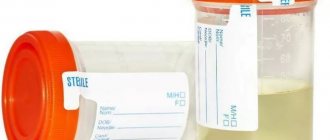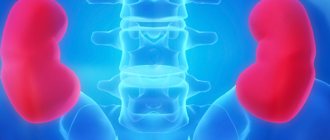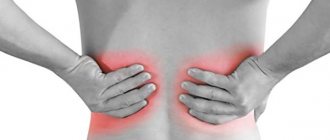Bilateral kidney damage, occurring with the proliferation of connective tissue and damage to the renal parenchyma, is called nephropathy. The causes of the disease are different, and a set of therapeutic measures is prescribed depending on the type of disease after a thorough diagnostic examination of the patient. The diet for kidney nephropathy is designed to reduce signs of intoxication and reduce the load on the urinary system.
About the causes and types of the disease
The term “nephropathy” includes pathological changes in the kidneys of various natures. The main reasons for the development of the disease are most often associated with:
- metabolic disorders in the body;
- the presence of malignant neoplasms;
- complications caused by taking certain drugs and intoxication;
- kidney stones and urinary tract infections;
- pregnancy;
- genetic predisposition to the disease.
- The most common types of nephropathy include:
- diabetic – occurs in diabetes and is accompanied by elevated blood sugar levels;
- dismetabolic (metabolic) – develops due to metabolic disorders and is classified into urate, phosphate and oxalate forms;
- nephropathy in pregnant women - kidney dysfunction during pregnancy;
- IgA nephropathy is a chronic type of glomerulonephritis that occurs with damage to the glomeruli and tubules of the kidneys against the background of complications in the functioning of various body systems.
For therapeutic and preventive purposes for nephropathy, in addition to drug therapy, dietary nutrition is mandatory.
Dietary table No. 7a
Prescribed for nephropathy, chronic renal failure, glomerulonephritis in order to reduce the load on diseased paired organs, normalize metabolic processes and reduce the severity of symptoms (edema, high blood pressure).
Proteins and salt are subject to restrictions, fats and carbohydrates are slightly reduced. Preference is given to products of plant origin. Daily protein intake is no more than 20 g, half of which is of animal origin. The volume of fat should not exceed 80 g, carbohydrates 350, of which 1/3 is sugar. Daily water consumption is calculated based on the daily volume of urine excreted, plus 0.5 liters.
About the basic rules of diet
A diet for nephropathy is prescribed by a doctor based on a comprehensive examination of the patient. The basic diet for kidney diseases is diet table No. 7, which has several options (No. 7a, No. 7b) depending on the types of nephropathy. These diets are aimed at normalizing the water-salt balance and diuretic function in the body, reducing swelling of the body.
The general principles of therapeutic nutrition include:
- reducing the consumption of fats, easily digestible carbohydrates and salt;
- low-protein diet with a gradual transition to protein plant foods;
- adjustment for potassium consumption (if the concentration of potassium in the blood is low, it will require an increase; if it is high, it will need to be limited);
- enriching food with minerals, vitamins, iron-containing foods, and vice versa, limiting foods containing phosphorus;
- compliance with the drinking regime;
- frequent meals up to six times a day in fractional portions;
- in culinary processing, preference is given to boiling, baking, steaming, fried foods are excluded.
Next, we will dwell in more detail on the most important points.
Protein nutrients
Kidneys functioning against the background of nephropathy have difficulty coping with nitrogenous toxins secreted by animal proteins. The daily intake of protein components should be gradually reduced, since their sharp limitation will become stressful for the body and may worsen the patient’s condition. First they switch to dietary varieties of fish and meat, and then to proteins of plant origin.
Salt-free nutrition
You need to avoid salty, pickled and canned foods. To gradually adapt the taste sensations, you need to add salt to dishes before eating, without using salt during their preparation. Lemon and tomato juice, herbs, onions, dried garlic, and fresh herbs will help improve the variety of taste. This measure normalizes blood pressure and eliminates the formation of swelling in the tissues.
What potassium “tells”
The level of potassium in the blood is the main indicator of the performance of the kidneys and heart, reflecting the state of water metabolism and blood pressure in the human body. Maintaining potassium levels is very important, and its deficiency, as well as its excess, can cause serious disturbances in the functioning of the kidneys and the entire urinary system as a whole.
Hypokalemia caused by potassium deficiency may indicate renal failure, adrenal dysfunction, and hyperkalemia (excess potassium) may indicate adrenal insufficiency and impaired renal excretion (for example, renal acidosis).
What you need to know about water and phosphorus
The diet involves drinking enough fluid. It is recommended to drink at least one liter of purified water per day. Drinking water in the morning on an empty stomach will “start” the body and help cleanse it of toxins. However, in the presence of swelling and excess body weight, the specified amount should be temporarily reduced until the causes of the listed symptoms are eliminated.
Positive dynamics of the disease are observed with a decrease in the consumption of phosphorus-containing products (sea fish, shrimp, cottage cheese, oatmeal, sesame, almonds), which aggravate renal hyperfiltration
A little about cholesterol and vitamins
Vasoconstrictor plaques, as a result of high levels of cholesterol in the body, are formed when consuming animal fats. Its excess also affects the condition of the renal capillaries, being one of the risk factors for their clogging. A low-carbohydrate diet that includes healthy foods helps lower cholesterol levels. To do this, you need to eat a lot of fresh greens, sprouted wheat, and any kind of cabbage.
Various multivitamin complexes containing calcium, selenium, zinc, iron, as well as seasonal vegetables, berries and fruits are prescribed as a source of vitamins:
- sweet peppers, beets, carrots, asparagus - vitamins A, E, carotene;
- currants, citrus fruits, rose hips - vitamin C;
- apples, plums - pectin, iron.
The effect of nutrition on kidney function
Malfunctions of the kidneys lead to disruption of the process of potassium excretion in the body, which is responsible for the performance of paired organs, the heart muscle and muscle tissue. Therefore, its excess or deficiency can lead to irreversible consequences in the body. Doctors recommend increasing daily potassium intake in the initial stages of nephropathy, and reducing it in later stages.
Excessive phosphorus content in human blood leads to the gradual leaching of calcium from the body, to the development of aching joints and the gradual thinning of bone and cartilage tissue. Phosphorus also causes tissue hardening, resulting in rapid growth of connective tissue in the kidneys, heart muscle, joints and lungs. Therefore, renal pathology is manifested by itchy dermatoses, heart rhythm disturbances and a feeling of heaviness in the lungs. In the acute period, it is necessary to strictly limit the intake of this element, which will help speed up the recovery process.
Sufficient intake of clean drinking water into the body is an important condition for a proper diet. Water helps cleanse the body of harmful compounds, which has a positive effect on the dynamics of recovery. To ensure good urine passage, during treatment it is necessary to avoid spicy, fatty, salty and canned foods, which retain fluid in the body and lead to contamination and increased swelling.
About useful and prohibited foods for nephropathy
The list of products approved for use for nephropathy includes:
- vegetables, berries, fruits, raw and heat-treated;
- dietary meat and lean fish;
- sour cream, cottage cheese, fermented milk drinks;
- eggs (no more than 2 pieces per week);
- vegetarian soups with vegetables and cereals;
- cereals and sago;
- pasta and pancakes, pancakes, salt-free bread;
- vegetable and butter oils, but unsalted;
- pumpkin seeds, sunflower seeds, cashews, almonds;
- decoctions of berries and herbs, jelly, compotes, weak tea with lemon.
You should limit your consumption of potatoes, rice cereals, peanuts and walnuts.
In this case, you need to completely avoid the following dishes and products:
- fatty meat and fish, sausages, canned food and smoked products from them;
- fats of animal origin;
- broths with mushrooms, fish and meat;
- marinades, pickles;
- mushrooms, legumes, radishes, sorrel, spinach, radishes, garlic, horseradish, onions;
- ice cream, cocoa, chocolate, sweets, sugar;
- ordinary bread, muffins and puff pastry, salted flour products;
- coffee, tea, carbonated drinks and alcohol.
About nutritional features for various types of disease
The clinical picture for any type of nephropathy is corrected, including diet. A balanced diet will be a sufficient measure in the early stages of the disease, while advanced forms of the disease require adherence to a strict therapeutic diet. Let's look at this in more detail.
Diabetic nephropathy: nutrition rules
As already mentioned, this disease is a consequence of diabetes mellitus. Therefore, the diet for diabetic nephropathy is designed to have a gentle effect on weakened kidneys and regulate blood sugar. In a complex of therapeutic measures for diabetics, salt-free, low-protein dietary table No. 7 is used in different interpretations:
Attention: The internal data of table “74” is corrupted!
Calculation of the energy value of the diet is carried out based on the energy consumption of the patient’s body, taking into account the glycemic index (GI) of foods.
Why is the food GI index taken into account?
The food GI index is an indicator of the “safety” of food for diabetic patients, reflecting the amount of carbohydrates ingested and broken down in the blood, which affect sugar levels.
A kidney diet for diabetes involves eating only foods with a low glycemic index - up to 50 IU. It is recommended to eat fresh berries and fruits, preferably in the morning. Purees and freshly squeezed juices are not suitable for diabetics, since mechanical processing leads to the loss of valuable fiber, and their intake can cause glucose spikes.
The list of permitted products for diabetic kidney nephropathy is sufficient to create a normal menu and includes:
- vegetables - any cabbage, tomatoes, pumpkin, squash, eggplant, bell peppers, herbs;
- berries and fruits - apricots, strawberries, currants, raspberries, pears, sea buckthorn, apples, citrus fruits;
- cereal porridges – buckwheat, barley, pearl barley, brown rice;
- fermented milk products;
- offal and lean meat;
- fish - cod, pike, pollock, hake, perch.
Basic information about nutrition for metabolic nephropathy
Metabolic nephropathy is caused by metabolic disorders and can manifest itself depending on the salts formed in the urine in urate, oxalate, and phosphate forms. The diet for dysmetabolic nephropathy is prescribed on the general principles of dietary recommendations for nephropathies with additional reference to the specific form of the disease:
Attention: The internal data of table “75” is corrupted!
The diet for children with dysmetabolic nephropathy includes strict adherence to the drinking regime at the rate of 5 ml/kg of weight. It is recommended to drink it at night, when it is easier for the kidneys to filter urine.
Briefly about other types of disease
With nephropathy in pregnant women, kidney dysfunction is observed, expressed by various symptoms. Nutrition in such cases is selected individually, taking into account concomitant diseases and general dietary indications for nephropathy.
The purpose of the diet for IgA nephropathy is to support the patient’s immune system, provide all the necessary nutrients and trace elements, in particular iron, and lower blood pressure.
In both cases, the diet is worked out by a nutritionist.









